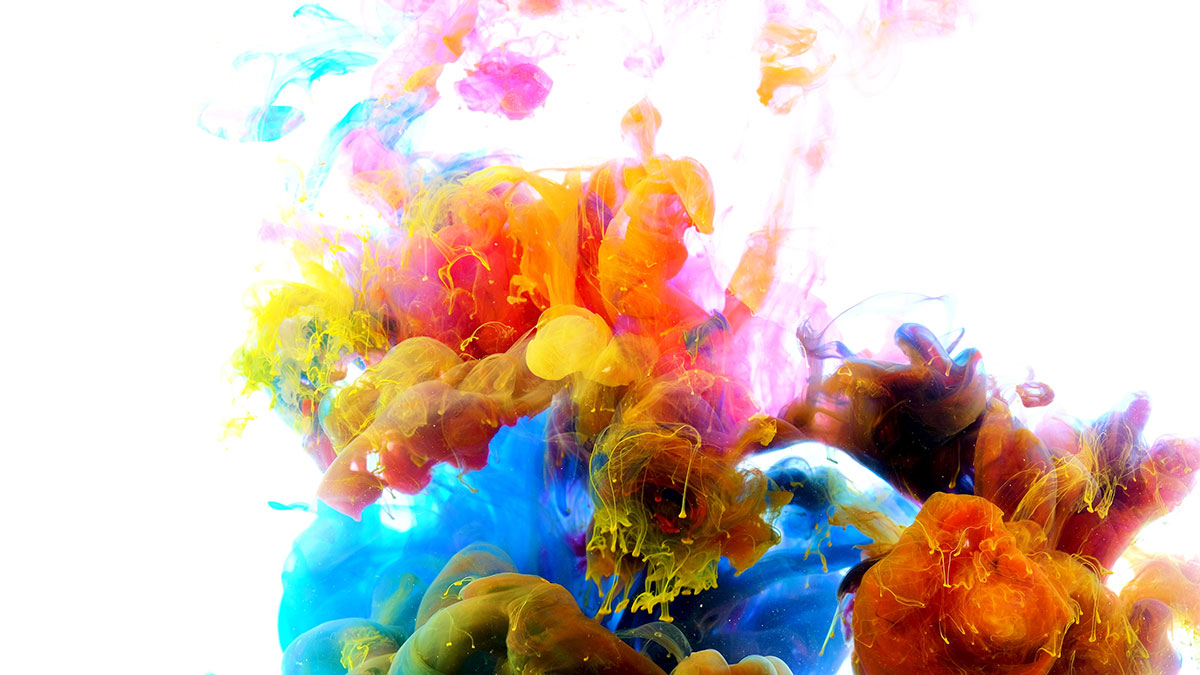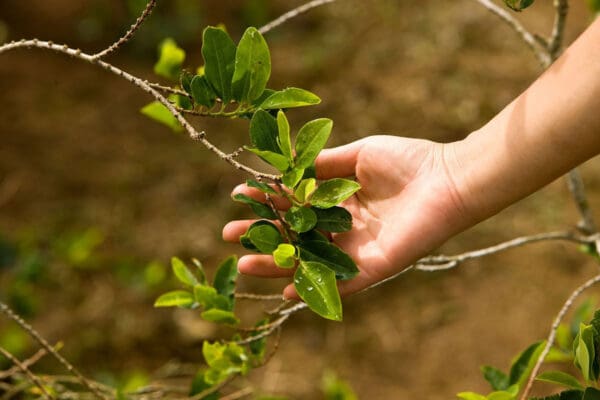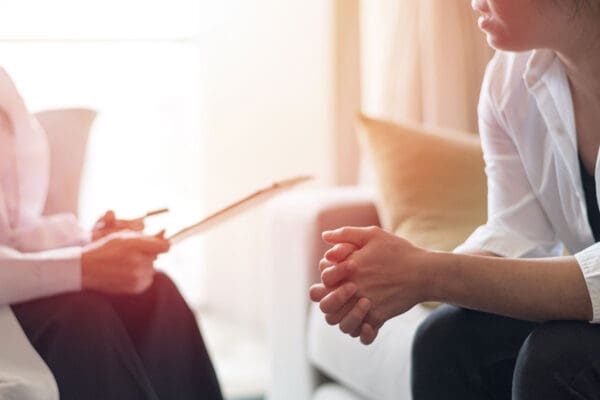Medical Editor: Dr. Benjamin Malcolm, PharmD, MPH, BCPP
Everything you want to know about ibogaine
Ibogaine, the indole alkaloid derived from the West African shrub, Tabernanthe iboga is known for its powerful visionary experience and its novel ability to treat substance use. Compared to other psychedelics such as psilocybin, ketamine, and MDMA, studies are lacking. It is also less accessible than other psychedelics and carries an elusive reputation as a result. Making sense of ibogaine can be difficult. To help you, this article has compiled over thirty of the most common questions people often ask about ibogaine therapy.
About Ibogaine
Where does ibogaine come from?
Ibogaine is derived from the root bark of the Tabernanthe iboga shrub found in equatorial Western Africa, most commonly found in Gabon and Cameroon. Ibogaine can also be found in a handful of other plants.
What type of molecule and substance is it?
Ibogaine is a naturally occurring indole alkaloid. It is also a complex tryptamine. In large amounts, ibogaine is classified as an oneirogen, meaning it is a psychoactive that produces a dream-like state. Ibogaine is known to produce rapid-eye-movement (REM) in large doses.
What is the difference between ibogaine and iboga?
Iboga refers to the root-bark of the Tabernanthe iboga shrub, and ibogaine is an alkaloid derived from that bark. Ibogaine HCL is usually derived in a lab and highly potent.
What are the different types of ibogaine I can take? Which one is best?
- The root bark is also referred to as “wood” from Tabernanthe iboga.
- Ground up and ready to be weighed for capsules or taken in spoonfuls
- Root bark to chew on
- This is a full spectrum source and ibogaine content is usually low
- Total alkaloid or “TA”
- A full spectrum alkaloid extraction from Tabernanthe iboga.
- TA has a higher concentration of ibogaine than root bark,
- It is a heavy green powder that will be capsuled for ingestion.
- Purified total alkaloid or “PTA”
- PTA consists of three alkaloids: ibogaine, ibogamine, and ibogaline.
- Ibogaine is usually around 85% of the extraction with ibogaline and ibogamine making up the rest.
- It is a tan, lightweight powder for capsules also derived from Tabernanthe iboga.
- Ibogaine HCL
- pure ibogaine extracted from the bark of Tabernanthe iboga, usually 90-99% potency
- Ibogaine HCL is a shimmery white powder, lightweight, and easy to put in a capsule.
- Voacanga ibogaine HCL
- Voacanga africana is a tree that grows in abundance in many parts of Africa. Ibogaine can be extracted from the Voacanga bark using a semi-synthetic extraction.
- It is a white powdery substance generally weighed and put into capsules.
- There is not a root bark or total alkaloid option for Voacanga. The other alkaloids in the Voacanga bark are dangerous to ingest.
- Voacanga-derived HCL is currently the only sustainable option for ibogaine.
One extraction isn’t necessarily better than another extraction. Total alkaloid and root bark extractions are often used for micro-dosing and psychospiritual journeys. The Voacanga and ibogaine HCL extractions may be most efficient for combatting withdrawals for substance dependency. Due to sustainability concerns, ibogaine providers are advocating for centers to use Voacanga ibogaine HCL until iboga grow projects have produced sustainable methods for Tabernanthe iboga extractions.
What is a microdose of ibogaine?
A microdose of ibogaine is usually considered 30mg of ibogaine or less.
What is a flood dose?
A flood dose of ibogaine is a large amount of ibogaine that triggers a rapid-eye-movement visionary state. Flood doses are delivered in treatment centers, and individuals usually have a specific reason they have sought out ibogaine treatment.
What is a booster dose?
Booster doses are usually given to an individual after they have recovered from their ibogaine treatment and are still in the care of an ibogaine treatment center. They may be used for post-acute withdrawals (PAWS) or to deepen introspection after the initial ibogaine experience. There is not a one size fits all guide for ibogaine dosing. Booster doses are usually given while someone is still being monitored, which helps eliminate the risks of ibogaine.
Booster doses are larger than microdoses and might be in the 50mg-200mg or 1-2mg/kg range. Please don’t take any amount of ibogaine without being thoroughly screened by a trained professional. Adverse events have occurred in as little as 3mg and 10mg of ibogaine and deaths have occurred in as little as 300mg of ibogaine.
<h3> Did Oakland, California legalize ibogaine? Did other cities legalize it?
No. In June 2019, Oakland decriminalized iboga and ibogaine, as well as other plant medicines. Other cities such as Santa Cruz, CA, and Cambridge, MA have followed suit.
Brazil, however, recognizes ibogaine as a treatment for substance abuse. New Zealand also recognizes ibogaine as a medical treatment, and South Africa has ibogaine listed as Schedule 6, meaning some medical professionals are allowed to prescribe it.
About the Ibogaine Experience
Am I going to vomit?
Possibly. It is common to vomit for those that choose to do iboga root bark ceremonies.
However, some people vomit on ibogaine. Fasting for 9-12 hours before an ibogaine treatment and taking an anti-nausea medication that is safe with ibogaine 1-2 hours before ibogaine ingestion might help lower the chance or severity of vomiting. However, some anti-nausea medications contraindicate with ibogaine. Please make sure your ibogaine provider and medical staff provide any medication you take.
Vomiting is often related to movement while on ibogaine. Laying still will help.
Does ibogaine really reset the brain? Does it reset the dopamine system?
Many people describe that they feel “reset” after ibogaine. We know ibogaine has neuroprotective and neuroadaptive properties and that through GDNF modulating, neuroplasticity is instigated. GDNF, among many things, protects the survival of dopaminergic neurons. This may account for why some people feel like they have hit a big reset button after their ibogaine experience.
Do centers have waiting lists? Can I get in somewhere quickly?
Some centers have waiting lists, and some centers work with a limited number of people at a time. There will always be an ibogaine center that will take your money and book you in immediately. Reputable ibogaine providers will take the time to screen you, ask for medical tests, and make sure you are prepped before you arrive. This question should be rephrased to, how long does it take to prep for an ibogaine treatment? and how do I find a reputable ibogaine center?
How long does ibogaine stay in the system?
Medical professionals working with ibogaine claim that noribogaine (ibogaine’s metabolite) works in the system for about 90 days. However, we don’t have concrete evidence, although some studies suggest weeks or months.
Is ibogaine scary? Can I have a bad trip?
People on ibogaine usually claim they do not lose their “sense of self.” It is often compared to a lucid dream. This eliminates fear as one always knows where they are, who is monitoring them, and that they are in safe hands.
Is ibogaine like mushrooms?
Ibogaine is an oneirogen. It produces a dream-like state rather than traditional hallucinations or visual open-eyed distortions. While on ibogaine, individuals are laying down with their eyes closed. It is a very different experience from other psychedelics.
What is a grey day and will I have one?
Ibogaine is a long and challenging process. A “grey day” is an ibogaine industry term for the day after ibogaine is taken. Most people experience some sort of grey day, although it can manifest in many different ways. Most people have an incredibly unpleasant “day 2”.
A wide variety of emotions may come up during this time. In addition, most people do not feel recovered from their ibogaine experience yet. At this point, people are often tired of laying down (but don’t have the energy to walk yet), still unable to eat solid foods, still feel some effects from ibogaine, and also might be experiencing severe insomnia.
This can be a surprise to people who have read that they will feel amazing after ibogaine. In reality, most people don’t feel better until day 3 or 4, after they have gotten sufficient sleep, nutrients, and electrolyte hydration.
Is a spiritual guide necessary for my ibogaine experience?
This is up to the individual. Some ibogaine providers incorporate other healing modalities into their work. There are also Bwiti initiates who have combined traditional ceremonies with safety protocols. If you feel pulled in the direction of Bwiti, research who is providing a safe and spiritually led experience.
What is integration and do I need it?
Integration is the process of incorporating your ibogaine experience into your daily life. It’s the process of getting back to your life after an often profound, difficult, and possibly abstract experience and making the most out of your experience so that you can reach your intentions.
Ibogaine is not a magic bullet. Without integration or some form of therapy or after-care, the ibogaine “glow” will wear off eventually, and you may find that old patterns and habits return.
What does ibogaine work for?
Disclaimer: Ibogaine is not a cure for anything. Many people seek out ibogaine for things that have not been researched. It is important to remember that ibogaine experiences vary between individuals and what works for one person may not work for another. Ibogaine is a tool and a powerful catalyst for change when the participant also puts work into oneself in the days, weeks, and months afterward.
Does ibogaine work for OCD?
Some people have said ibogaine has helped their ruminating thoughts and OCD tendencies. We do not have researched data on the subject.
What’s up with ibogaine and hep-C?
Some people claim their hep-c goes into remission after ibogaine. There has been limited research on ibogaine for the treatment of hepatitis C, but anecdotally the results are positive. A liver panel needs to be completed before ibogaine treatment to ensure the liver can handle metabolizing ibogaine. Additionally, HIV-1 reduced viral loads are being studied in relation to ibogaine.
Does ibogaine work for Narcissistic Personality Disorder (NPD)?
The answer is that science doesn’t know yet. Many people claim that ibogaine is good for many things, specifically the discarding of layers of false self-identification. Ibogaine will not magically make you a different person. For ibogaine to work, you have to put in the work. It’s a hard journey. If you believe your NPD is rooted in trauma or behaviors that you can unwind and peel the layers off from, it may be worth a shot.
Will microdosing ibogaine help my emotional numbness and anhedonia?
There is some evidence that ibogaine helps the post-acute withdrawals (PAWS) that are associated with amphetamine use. Anhedonia is one of the major PAWS symptoms for amphetamines. There is also some evidence that ibogaine may be good for depression. Microdosing is a subtle process that takes a long time. Looking into a full ibogaine treatment may be a better option. Also, ayahuasca and microdosing psilocybin may be easier to access and safer options.
Does ibogaine work for kratom like it does opioids?
Kratom is not an opioid. However, it is recognized as a partial opioid receptor agonist, meaning it has some action at opioid receptor sites. With long-term, daily use, many people experience withdrawals similar to opioid withdrawal. Ibogaine can help eliminate kratom withdrawals. However, kratom is cardiotoxic and carries some of the same cardiac risks as ibogaine. For safety reasons, kratom users will need to switch to a short-acting opiate (SAO), such as morphine or oxycodone, for a period of time before their treatment. This switch will also give time for kratom to leave the serotonin system, which will help avoid post-acute withdrawals, such as depression.
Can ibogaine help my ADHD?
Addiction specialists have theorized that stimulant abuse may sometimes be self-medication for ADHD. Prescription medications for ADHD are stimulants and ibogaine is also a stimulant. There are no studies in regards to the use of ibogaine for ADHD, but it may be reasonable to assume that ibogaine could help manage ADHD. Some anecdotal reports also support this idea. For safety reasons, you cannot take ibogaine in combination with any stimulants or ADHD medications. Most providers recommend stopping all stimulants 7-14 days before any ibogaine.
Can ibogaine help with trauma or PTSD?
Many people seek out ibogaine for trauma. There is limited research on ibogaine for PTSD, but it does appear promising.
Tell me more about anecdotal reports for what ibogaine works for.
Ibogaine is an individualized experience. It appears to be an effective habit breaker, seems to help people feel liberated from challenging circumstances, and is sought out for many reasons.
- There is some headway with some providers and the theory behind ibogaine and Parkinson’s.
- SSRI damage, depression, and post-SSRI sexual dysfunction have some promising anecdotal reports.
- Some people seek out ibogaine treatment for chronic pain, fibromyalgia, peripheral neuropathic pain, eating disorders and body dysmorphia, sex and porn addiction, chronic Lyme disease, and other auto-immune disorders. There is no research on these conditions, and outcomes appear to vary from person to person.
Ibogaine has the potential to help people in many different challenging circumstances. However, it may be worth looking into ayahuasca or psilocybin for some of these conditions first. It’s also vital that the individual seeking out treatment is thoroughly screened beforehand and treated by a professional with medical staff.
Ibogaine Safety
What are the chances that I am going to die on ibogaine?
Ibogaine has many risks and people have died on ibogaine. However, fatalities are usually associated with pre-existing conditions, higher dosages, and substances that contraindicate with ibogaine. Never use ibogaine alone — always find a trained professional to work with.
Making sure that you choose a center that thoroughly pre-screens all clients, monitors EKGs and vital signs throughout the entire treatment, and discharges only when clients are safe will eliminate some of the risks of ibogaine treatment.
Can I take ibogaine if I’m pregnant?
There are no studies on ibogaine and pregnancy, but we can assume that due to the risks of ibogaine, it would be too dangerous. However, there are some anecdotal claims that ibogaine is beneficial for fertility.
Can I take ibogaine while on meth?
No, please don’t do this! Don’t take ibogaine with any stimulants. Ibogaine is a stimulant, and doing so could amplify the effects of both. Ideally, an individual needs to be off all amphetamines for 7-14 days before ibogaine. Not doing so increases cardiac risk and liver impairment. It is essential to note this could be a lethal interaction.
What happens if I do heroin after my ibogaine treatment?
The risk of overdose is high after ibogaine as ibogaine resets an opioid tolerance to a pre-dependent state. Ibogaine also potentiates opioids. If ibogaine is still in your system, this is a mix for an overdose. This is very dangerous and should be avoided at all costs.
How long can I wait to drink alcohol after ibogaine?
Ibogaine lowers tolerance to alcohol. There are also many anecdotal reports that alcohol diminishes the long-term benefits of ibogaine. Waiting 90 days is your best answer for safety and efficacy.
How long do I have to wait to take other psychedelics after ibogaine?
There have been alleged fatalities with ayahuasca administered 1-2 weeks after ibogaine treatment. The safest thing to do is wait 90 days. There are no studies on psychedelics after ibogaine. Waiting a long period of time is the best way to experience the full effects of ibogaine and to remain safe.
The internet is full of testimonials regarding ibogaine, both good and bad. Ibogaine has the potential to help many people, but it is not a pleasant experience and requires a lot of personal inner work from the individual in the weeks and months after. Some individuals may find more positive experiences with other psychedelics and should research all of their options thoroughly. If ibogaine becomes the best option, do as much research as possible and go into the experience with clear intentions and a plan for afterward. There is no shortage of questions about ibogaine, and we can only hope that with time researchers will catch up to the many questions people have regarding this substance.







